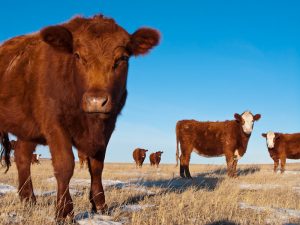Meat is a complex and controversial issue. Can it be part of a diet that is ecologically sustainable and socially just? Arguments rage about this issue. One of the complexities is that meat is produced in very variable ways. The very best systems of pasture management can, it is argued, sequester more carbon into the soil than is necessary to offset the methane the cattle produce. They can also be part of restoring biodiverse habitats. In a blog in June I sang the praises of Will Harris of White Oak Pastures. However this represents the very apex of good meat production. The vast majority of meat production is very much less sustainable. Most animals raised for human consumption are fed on grain and soya that would be much more beneficially eaten directly by people. Even the best systems of meat production use a lot of space per unit of food produced. It would certainly be a good thing if humanity could massively reduce its meat consumption, say by 80 or 90%.
One of the common assumptions people writing about population and diets was that as people get richer they would eat more meat. Throughout the Twentieth Century this held true: not any more. Veganism is growing rapidly in many countries, and it seems especially so among the young and better educated. Also for many of us who are omnivores we are eating a lot more meals that are plant based, with a very much reduced intake of meat and dairy.
Globally levels of meat consumption vary a lot. Argentina and Uruguay top the table of per capita meat eating. India and China traditionally ate very much less but as people are getting wealthier they are eating more. Total global meat consumption is still rising but this may not go on much longer if veganism, vegetarianism and low meat lifestyles become more common, as I think they probably will.
If humanity could reduce its meat consumption dramatically, (say by 80%) that would free up an enormous area of land for other purposes. Some of this could be used for agroforestry or renewable energy projects, but the vast majority could be used for rewilding. Increasing the area of forests in the world could help restore habitats thus allowing biodiversity to flourish again, and it would be a very effective way of sequestering carbon, so vital in helping combat climate change.
Some people think that cultured meat, grown in laboratories, will replace traditional meat eating. Others see vegetable based meat substitutes, like textured soya protein as having a major role. Some argue we should switch from traditional meats to insects. Maybe meat eating will simply decline without the need for ersatz meats. Any of these perspectives may prove to be true. It is too early to say.



